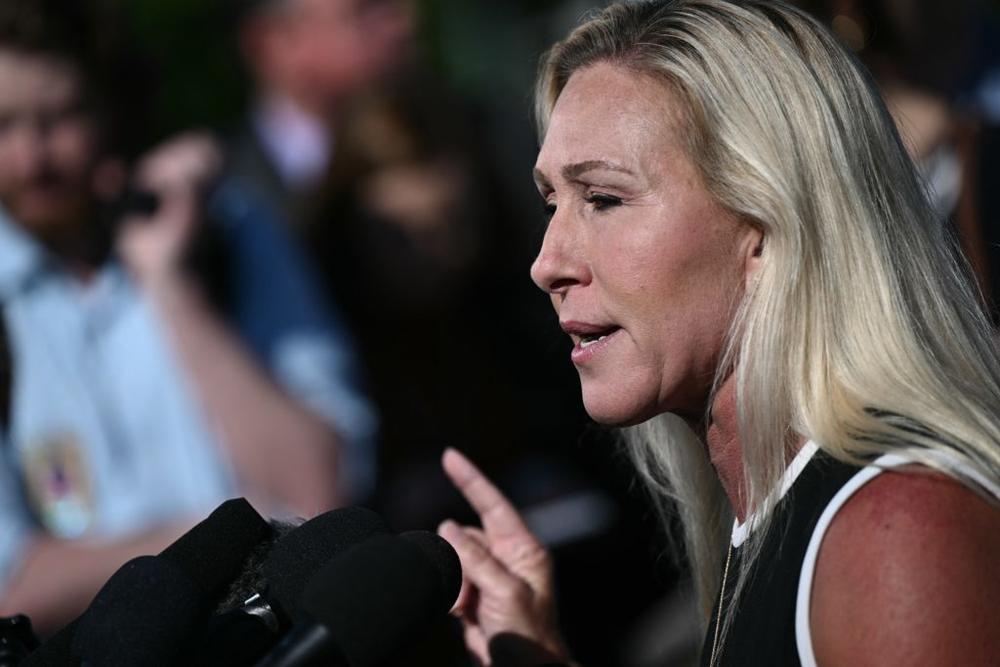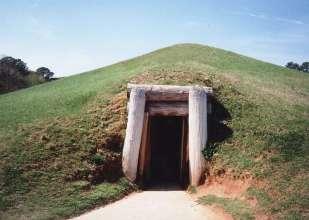
Section Branding
Header Content
Georgia Today: Waffle House workers try to unionize; Chatham County DA race; Ocmulgee Mounds park
Primary Content
On the Wednesday April 1st edition of Georgia Today: Waffle House workers try to form a workers' union; Democratic candidates face off in the race for Chatham County District Attorney; And Georgia is one big step closer to getting its first national park.

Peter Biello: Welcome to the Georgia Today podcast from GPB News. Today is Wednesday, May 1, 2024. I'm Peter Biello. On today's episode, Waffle House workers try to form a union. Democratic candidates face off in the race for Chatham County District Attorney. And Georgia is one big step closer to getting its first national park. These stories and more are coming up on this edition of Georgia Today.
Story 1:
Peter Biello: Labor organizing is on the rise again in the South, including in Georgia. Some of the latest workers trying to unionize the folks at the Waffle House. GPB's Amanda Andrews reports.
Amanda Andrews: The inside of a Waffle House is filled with sounds from the chef working the grill to the host calling out orders and cleaning plates. But recently, workers have been making noise outside the Waffle House.
Crowd: You're no good! Treat your workers like you should!
Amanda Andrews: In March, longtime Conyers Waffle House employees Cindy Smith and Katie Giddy led a group of about 50 protesters and union members in chants right outside the building where they usually work.
Crowd: Put some respect on my check!
Katie Giede: We deserve 25 an hour. We deserve 24/7 security. We deserve an end to unfair paycheck deduction. And we deserve respect from management.
Amanda Andrews: The protest was part of a weeklong strike supported by the Union of Southern Service Workers.
Katie Giede: If nobody ever stands up, nothing will change. But if we all band together, they have no option. They can't screw us all over.
Amanda Andrews: Federal minimum wage is $7.35 an hour. But restaurant workers, like the people at waffle House are paid a tipped wage. They can make as little as $2.13 an hour plus tips. Cindy Smith says her pay hasn't changed in years.
Cindy Smith: No, the wages have been the same since I started. 2.92 an hour. Not including tips since I started in 1995.
Amanda Andrews: Then there's the meal deduction. Waffle House takes at least $3 from workers checks to pay for an on shift meal, whether they eat it or not. Smith, a mom, says even with tips, she only makes 16 grand a year.
Cindy Smith: I go to bed hungry most nights. I've lost 192 pounds. Not because I want to, but because I haven't been able to eat. I can't afford groceries. I can't afford rent. If it wasn't for my son's dad, I would have anywhere to live.
Amanda Andrews: Hannah Goldberg is a sociology doctoral student at the City University of New York. She says some workers are very happy, adding around 20% of their table's tabs to their take home pay.
Hannah Goldberg: Workers attachment to the system and commitment to tip earning, is exponentially higher in the fine dining sector, where menu prices are higher, and tips are higher too.
Amanda Andrews: But a 20% tip on the Waffle House All Star special is just $2.30. Goldberg says the instability of the restaurant industry in general is another reason wages are low.
Hannah Goldberg: Employers definitely push this narrative that, oh well, if wages go up, we might just go out of business. Or if wages go up, we're going to have to lay off half of you or more.
Amanda Andrews: Being fired for almost any reason, even union organizing, is a very real concern in Georgia, which is one of 28 states with so-called right to work laws. Atlanta North Georgia Labor Council President Sandra L Williams says many people don't understand the term.
Sandra L. Williams: And we've had some people that were unknowingly say, oh, we definitely for right to work.
Amanda Andrews: But she says employers know, for them?
Sandra L. Williams: It just means you have the right to terminate without cause.
Amanda Andrews: Which can leave employees who really want a union very scared to speak up.
Sandra L. Williams: What they have seen in the past is that if you start that union talk, if you will, we're gonna get rid of you because you are a troublemaker.
Amanda Andrews: Waffle House labor organizers like Katy Giede say they are not deterred.
Katie Giede: We will not be intimidated by scare tactics and we will keep coming together.
Amanda Andrews: Meanwhile, workers filed a complaint with the U.S. Department of Labor about that $3 per shift meal deduction. For GPB News, I'm Amanda Andrews in Conyers.
Story 2:
Peter Biello: The two Democratic candidates for Chatham County District Attorney, including the incumbent, faced off in a voters’ forum this week in Savannah ahead of the May 21st primary. Early voting is underway now, and voters are weighing in on how justice is served in their county. GPB's Benjamin Payne reports.
Benjamin Payne: And making her case for a second term, Chatham County D.A. Shalena Cook Jones pointed to what she called her efficient system of justice.
Shalena Cook Jones: We have tried more murders, serious violent felonies and DUIs in the three and a half years that I've been there than they did before Covid. True leaders know how to do more with less,.
Benjamin Payne: Less personnel, that is. Since Cook Jones took office. About 40 prosecutors have left. Challenger Jenny Parker was one of them.
Jenny Parker: I have about 12 experienced prosecutors willing to come back with me as part of a team. Our district attorney's office needs that team right now.
Benjamin Payne: Parker says a goal of hers is to reopen the Special Victims Unit, which shut down during her opponent's tenure. Cook Jones says her office has been hamstrung by sparse budgeting set by the Chatham County Commission. For GPB News, I'm Benjamin Payne in Savannah.

Story 3:
Peter Biello: Georgia Congresswoman Marjorie Taylor Greene says she'll call for a vote next week on ousting House speaker Mike Johnson. The Rome Republican is forcing members of her party to take sides after Democrats, including Minority Leader Hakeem Jeffries, said they'd provide the votes to save Johnson as speaker. Speaking outside the Capitol today, Greene railed against congressional leaders.
Marjorie Taylor Greene: Hakeem Jeffries is endorsing Mike Johnson because he knows Mike Johnson's leadership is going to hand the House majority to the Democrats in January.
Peter Biello: Johnson called Greene's attempt to oust him, quote, wrong for the country.
Story 4:
Peter Biello: Governor Brian Kemp signed a package of agriculture bills into law yesterday. One of them prohibits any agent of China and other countries labeled as foreign adversaries from buying Georgia farmland or land within ten miles of a military installation. Democrats in the state legislature said the bill is discriminatory, but Governor Kemp touted it as a national security measure. Kemp also signed into law a bill that establishes licensing requirements for growing hemp.
Story 5:
Peter Biello: Atlanta law enforcement officers are working together to assemble kits that will help children deal with potentially traumatic situations. Officers from the Atlanta Police Department and the Fulton County Sheriff's Office are both participating in the First Responder Kits for kids’ program. The kits, compiled by volunteers, include a variety of toys and activities to distract and relieve children during stressful situations. Major Aprile Moore works for the Fulton County Sheriff's Office. She says it's important to her that children are taken care of.
Aprile Moore: These kids are providing an opportunity for the kids to not be paying attention to the turmoil or the chaos that may be going on, and they can be distracted just enough for us to ensure that they are safe, while our other partners are able to take care of the issue at hand.
Peter Biello: Officers from both departments will carry these kits as a tool for emergency calls when children are present.

Story 6:
Peter Biello: Georgia is one big step closer to getting its first national park. Today, a bipartisan group of Georgia lawmakers introduced a bill to the U.S. House and Senate that would make the Okmulgee Mounds National Historic Park in Macon. The Okmulgee Mounds National Park and Preserve it would be Georgia's first national park, but it would also be an enormous milestone for the Muskogee Creek nation of Oklahoma. GPB's Grant Blankenship sat down today with Tracie Revis, who has been an official advocate for the park, to learn more.
Grant Blankenship: You are former chief of staff to Muskogee Creek Nation Principal Chief David Hill. You're a Muskogee citizen. Meanwhile, you've lived here in Macon for a few years as a part of the effort to create the national park. In the time you've lived here. What have you come to learn about what Georgians know about their connection to the Muskogee Creek Nation?
Tracie Revis: Yeah, well, first and foremost, this was not something that I ever saw myself doing was moving back to the homelands to be a part of these efforts. But it's been an incredible time. Coming in was a hard adjustment, realizing that there are zero federally recognized tribes in the state of Georgia. And that that really people here don't know who we are authentically. They don't know what happened, accurately about when we were here and how we were removed, but even more so, they don't know what happened to us when we left, what happened at the end of removal, and the Trail of Tears when we made it into Oklahoma. So it's really been an opportunity to educate this community, to just showcase who we are today as a sovereign nation and show those stories of survival.
Grant Blankenship: What do you what do you know about what people know about the connection of the Okmulgee Mounds to Oklahoma?
Tracie Revis: You know, interestingly enough, our capital city in Oklahoma, where our tribal headquarters sits is Okmulgee, Oklahoma. And most people in middle Georgia were very unaware that the Okmulgee River, the McGhee mounds, the park. This was a capital city. And so most people are unaware why we named our capital city in Oklahoma, Okmulgee. And so that's been one of the things that's been really interesting. But I think it's also knowing how we use the land, what the mountainsides actually were for, how long we were in this region. All the words, how to say the names, the entire state of Georgia. I say this often. You cannot throw a rock in the state of Georgia and not hit cultural land. And it's our words and those same words translated into Oklahoma. So you will find the same words in Oklahoma that you find here in Georgia and Alabama and Florida.
Grant Blankenship: Yeah. And to be clear, I mean that that history stretches back into what, mainstream historians call prehistory. I mean, we know this about the tribal history of Georgia, right?
Tracie Revis: We know that we were here. What's difficult is that because the mounds and the park itself were built around the archeological dig from 1936. The history has been told from an archeological standpoint, as if we are the dinosaurs of the days that came from this land. And there is not context of who we were culturally and how long we were here before. If you say that Columbus landed in 1492, an Indian removal is 1830. There's roughly about 400 years in there of history that is not taught in school.
Grant Blankenship: So the Ocmulgee Mounds, they've already been in the national park system for years. When this bill passes, what's going to be different?
Tracie Revis: The national park is going to be different from where we've been in that the nation will actually have the tribal nations. The Muskogee Creek nation will serve as a full co-manager. Currently, there are four other parks in the National Park Service that have codified co-management provisions. What that means is, in law, they are required to have a management section, whether that is hunting and fishing rights that were treaty based, whether that is adjacent to their tribal land, to the reservation base, or that they have hunter gatherer, or that they are the only ones who can tell the, the, cultural stories in those lands of the 460 plus national parks in the, in their system. There are only four that have those provisions. What we are doing with the Okmulgee Mounds is that the nation, as it gets re designated, will be sitting at the table to create the management plan for this new expanded national park and preserve that we will not only do the cultural piece, but we will do the land management, the species management. We will talk about direct hiring to allow our citizens to actually work, to be the storytellers of this land. We are going to look at the arts and crafts that are sold at the park to make sure that they are authentic Creek citizens, and that we aren't having replica, pieces being sold as if they're ours. So it's really going to put a nation, a tribe in a position to truly be partners with the National Park Service, to not only co steward these lands, but to co-manage these lands.
Grant Blankenship: We already touched on a little bit of this, but what aspects of the cultural and historical story do you imagine are going to be re-emphasized or newly emphasized, as that management plan shapes up?
Tracie Revis: So the park does a great job of talking about the archeological dig, that there were people here, and we know that we have carbon dating, and they do that already. But where we really need to expand is the people. If somebody was to find your relics laying in the ground today, would they know who you were? There wouldn't. And so it's looking at the authentic piece of how we actually formed these, these mound sites, and what did that mean when we came to council here, when we had tribal towns up and down the river. And so when you look at this history, it gives you a context of how big these civilizations really, truly were. And we traveled all over the globe to look at ancient civilizations. Right? We have that here in our backyard, in these lands, and allowing the cultural piece to come in and tell these stories helps fill in those blanks.
Grant Blankenship: So sort of tucked in at the bottom of the bill is this provision to establish, what the bill calls Indian country and 126 acres of land, like in the park footprint already owned by the Muskogee Creek Nation. Give me just a taste of the importance of that, should it happen. I mean, what the future implications for the nation.
Tracie Revis: Well, this is absolutely, one of my favorite provisions in the bill. And this is such a huge win for Indian country. So the nation had to buy their own land. Back here in the homelands. And so it is 126 acres. It is culturally significant to us. It is within the Omaha corridor. We know that up and down the Okmulgee River, while the park itself only has, eight mound sites in it, we know that there are additional mount sites up and down the river. So purchasing this land was important for us because we need to protect these cultural sites. We are not looking to dig them up. We want to keep everything preserved protected in the land where it is. I don't know that this is true for the entire state, but I can say this middle Georgia region, this community that I've worked with, for the last two and a half years, they are sincere in their efforts to want to welcome the nation back, but not for us to be paraded down Main Street for us to come and say, this is who we are. This is what we're asking of you and let us do it our way. But as we work forward and work alongside our partners, we survived this forced removal. And this is truly an opportunity for us to reconcile this history, to come back into our lands. It's humbling. It's emotional. It is not something that can be wrapped up in a bow. And I am beyond honored to be able to serve in this role, to serve my family, to serve my community, and to really work alongside, this, this community as we move forward to create Georgia's first national park and the next national park in the country.
Grant Blankenship: Tracie Rivas, thank you again for talking to me today.
Peter Biello: That was GPB's Grant Blankenship talking with Tracie Rivas of the Muskogee Creek Nation about the new bill, which would create Georgia's first ever national park at the Ocmulgee Mounds in Macon.

Story 7:
Peter Biello: A small group of rideshare drivers gathered near the state capitol in Atlanta today to join a nationwide day of action. The Atlanta drivers were part of work stoppages to highlight what they say is the need for job regulations, fair pay and an end to unfair APD activations. John Teckle has been driving for Uber for a decade. He says he tells customers drivers aren't seeing any money from the rising costs of using the app.
John Teckle: I tell them, you know, please call Uber or call Lyft, ok? You're not paying us. You pay so much. But we're getting about 20% or 10% out of what you're paying, and they're taking everything.
Peter Biello: Justice for App Workers Coalition is the main group organizing rideshare drivers in Atlanta. The group represents more than 130,000 drivers across the country.
Story 8:
Peter Biello: Atlanta Braves fans right now are unable to watch their favorite team on Comcast because of a dispute between the cable company and Diamond Sports Group. Several MLB teams are caught up in the dispute. In a statement on social media, Bally sports, which broadcasts Braves games and is owned by Diamond Sports Group, says Comcast rejected a proposed extension that would have kept Bally on the air. Comcast says it has been flexible with Diamond Sports Group, which is in bankruptcy proceedings but have not been able to reach an agreement and therefore Comcast doesn't have the rights to the programing. Comcast says it will proactively credit customers associated costs. That's about 8 to $10 a month. Braves fans using other cable providers or streaming services are not impacted.

Story 9:
Peter Biello: Governor Brian Kemp has signed into law a bill that makes it easier to prosecute people after fentanyl overdose deaths. GPB's Sofi Gratis has more.
Sofi Gratis: Also called Austin's law after a 30 year old man who died from taking a counterfeit pill. The law creates a new felony offense of aggravated involuntary manslaughter that could result in a life sentence. Manufacturers or sellers of a drug do not have to know what was in it in order to be charged. Mazie Lynn Guertin, with the Georgia Association of Criminal Defense Lawyers, worries the new law could counter public health efforts to curb the opioid epidemic.
John Teckle: Part of what we see happen within the community of people using drugs that they sometimes sell them to each other. So if that's who ends up getting prosecuted, I don't know that that's serving our community.
Sofi Gratis: The law does not affect Georgia's medical amnesty law, which protects 911 callers in the case of overdoses. For GPB News, I'm Sofi Gratis.
Story 10:
Peter Biello: In sports, Luis Castillo threw seven shutout innings in the Mariners’ bullpen, held on for a 3 to 2 victory last night over the Atlanta Braves. Castillo retired the final 11 hitters he faced and allowed just three hits against the second best offense in baseball. The Braves have now lost consecutive games for the first time this season, the last team in the majors to do so. And quarterback Stetson Bennett has rejoined the Los Angeles Rams for the start of their offseason program after missing his entire rookie season for undisclosed reasons. The former Georgia Bulldog is attending team meetings and lifting weights with his teammates at the Rams training complex. He had been placed on the reserve non-football illness list five days before the Los Angeles regular season opener last year, a move not related to a shoulder injury.
Peter Biello: And that is it for this edition of Georgia Today. If you want to learn more about any of these stories, visit GPB.org/news. We highly recommend you do it now. It'll keep us current in your podcast feed, and if you've got feedback, we'd love to hear from you! Email us. The address is GeorgiaToday@GPB.org. I'm Peter Biello. Thanks for listening. We'll see you tomorrow.
---
For more on these stories and more, go to GPB.org/news



